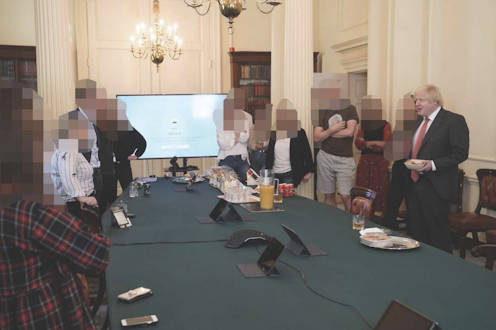
The House of Commons Committee of Privileges has released a damning report on former prime minister Boris Johnson, ruling that he deliberately misled parliament over the partygate affair and recommending that he be denied a pass giving him access to parliament as a former member. The committee concluded that were he still an MP, he should be suspended for 90 days. But since Johnson resigned upon seeing a draft of the report, he will not serve the suspension. The report is nevertheless still highly significant. Here’s why.
What is the privileges committee?
The House of Commons Committee of Privileges is composed of MPs from the three largest parties in parliament. Its role is to uphold ethical conduct in the House of Commons alongside the Committee on Standards.
What was Johnson accused of and why does it matter now he is no longer prime minister?
The principle accusation against Johnson is that he misled the House of Commons in relation to gatherings held in Downing Street while pandemic lockdowns were in place. Over the course of the partygate scandal, Johnson made numerous statements to the House of Commons about what he did or didn’t know and what he did and didn’t do. The narrative of his account shifted over time as new evidence came to light, creating a complex situation in which the house was certainly given incorrect information at various times.
The question of whether the house was misled, however, rested on whether any of this incorrect information was given either “knowingly”, “recklessly” or “without proper and timely correction when the facts became known”. Importantly, from the outset of its investigations the committee adopted an expansive definition which did not require direct proof of Johnson having lied.
It has concluded in no uncertain terms that he wilfully misled the house and indeed the committee itself during the course of its investigations, accusing him of being “deliberately disingenuous” in order to mislead the committee. Johnson, the committee said, cannot credibly claim that he did not know lockdown rules were being broken in Downing Street during the pandemic and that he “had personal knowledge about gatherings”.
It also dismisses his defences before the committee that he reasonably believed no rules were being broken as “no more than an artifice” designed to justify his actions in retrospect.
Why is misleading parliament such a serious matter?
Misleading the house is treated exceptionally seriously because of the centrality of ministerial accountability to parliament within the uncodified British constitution.
The House of Commons standards process for ministerial accountability operates under a form of law called parliamentary privilege (from which the committee takes its name). Privilege is the mechanism which shields debate in parliament from the restrictions on free speech that apply to ordinary citizens so that MPs can speak freely. It also guarantees parliament the right to determine its own processes and procedures free from interference from the judicial and executive branches of government. Privilege is therefore widely viewed as a cornerstone of the UK’s democratic system.
As such, however, parliament is not required to observe any particular legal norms which derive from common law or statute law in dealing with cases through the standards system. However parliamentary committees commonly strive to create such fair processes, for example when dealing with witnesses at select committees, and the maximum extent of parliament’s powers under privilege have not been used for more than a century.
Johnson and his legal team contended that this process breached his right to due process. This is a right enshrined in UK law under the Human Rights Act of 1998 – a law which, incidentally, Johnson’s government attempted to abolish. However, even the lawyer representing Johnson has conceded that this right is not applicable to parliament’s procedures.
The privileges committee also pointed to the strenuous efforts made to ensure a process which is in line with the principles of right to due process and a fair hearing. Ultimately, both sides concede that parliament is fully within its rights to sanction its own members.
Would the report have forced Johnson out of the House of Commons?
Johnson resigned before the committee even published its report, claiming he was being forced out. But the report could not have done this on its own. The committee proposed suspending Johnson from parliament for 90 days, which would have triggered the provisions of the 2015 Recall of MPs Act. This would have given people in his parliamentary constituency the right to sign a petition to oust him.
Is a 90-day suspension longer than average?
The 90-day suspension Johnson was to serve is much longer than the most often commonly imposed sanction over the years, which has been a five-day suspension – not long enough to trigger a recall. As the committee notes, the length is also unprecedented for a contempt of parliament charge. However it is still lower than the six-month suspension handed to Labour MP Keith Vaz in 2019 after he admitted to buying drugs from sex workers.
The length of the sentence also reflects not only Johnson’s actions in relation to speaking about partygate in parliament but to his behaviour regarding the committee too. A lengthy sentence is due because of his “impugning the Committee and thereby undermining the democratic process of the house” and his “being complicit in the campaign of abuse and attempted intimidation of the committee”.
As Johnson is no longer an MP, the committee has instead proposed that he be denied a parliamentary pass available to former members. This pass has been withdrawn from other disgraced former MPs, most recently former Labour MP Chris Williamson over his links with Iranian state television.
Nicholas Dickinson does not work for, consult, own shares in or receive funding from any company or organisation that would benefit from this article, and has disclosed no relevant affiliations beyond their academic appointment.
This article was originally published on The Conversation. Read the original article.







